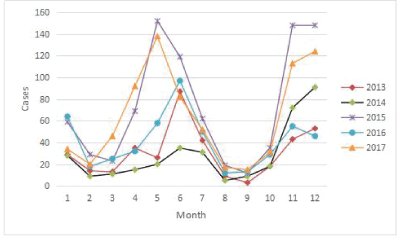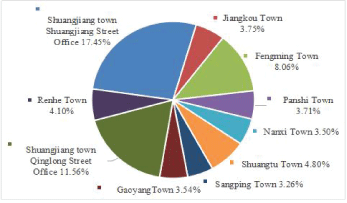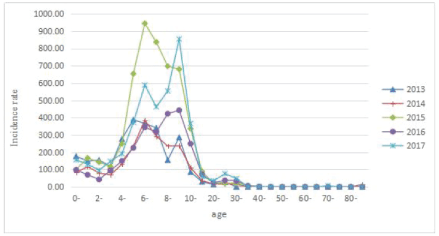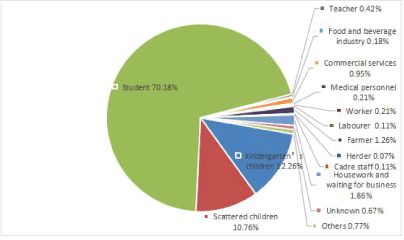
Figure 1: The distribution of varicella cases from 2013 to 2017 in Yunyang County.


Jiao Wei1-3 Mu Lihong1-3* Huang Xueqin4
1School of Public Health and Management, Chongqing Medical University, China*Corresponding author: Mu Lihong, Professor, Epidemiology of chronic diseases, epidemiology of infectious diseases Chongqing Medical University, No.1 Yixueyuan Road, Yuzhong District, Chongqing 400016, China, Tel: 13608360737; Fax: 023-68485008; E-mail: 1097123703@qq.com
Objective: To study the epidemic situation of varicella in Yunyang County from 2013 to 2017, and to provide the scientific basis for establishing measures of prevention and control.
Method: The data of varicella cases were from China Information System for Diseases Prevention and Control, and varicella outbreaks were from National Management Information System for Public Health Emergency. Statistical analysis was performed with the use of Excel 2003 and descriptive epidemiological analysis was performed.
Result: 2854 cases of varicella were reported in Yunyang County from 2013 to 2017, with average annual incidence of 61.67/100,000 and annual incidence of 36.45/100,000 to 92.05/100,000, in which the highest rate was in 2015 and the lowest in 2014; varicella occurred in all 4 sub district and 38 villages and towns; cases occurred all year round but with more in spring and winter; most of the sufferers were between 5 and 14 years old and students, kindergarten children and scattered children were susceptible population of varicella, in which 2660 cases were reported in total, accounting for 93.20% of the total; male to female ratio was 1.2:1 and 2404 case were reported in population under 15 years old, accounting for 84.23% ( 2404/2854); 26 cases occurred in clusters, mainly of middle and primary schools and kindergartens. There are few genotyping studies on VZV clinical isolates and no reports on new clade typing in China and susceptible population aged 1 and above recommended to get varicella vaccine in vaccination schedule.
Conclusion: Most varicella outbreaks in Yunyang County occurred during winter and spring and students, kindergarten children and scattered children were high risk population of varicella. We should improve the living and learning environment of schools, knowledge so coverage rate of the first injection of varicella vaccine and maintain high coverage rate in children, as well as actively discuss about the second injection, in order to effectively control varicella situation and protect public health.
Varicella; Epidemiological characteristics
Varicella is a highly contagious acute respiratory disease caused by varicella zoster virus, and mainly composed of unilateral clustered varicella herpes [1]. The source of infection of varicella is patients with varicella and zoster virus, and the routes of transmission are air droplet, direct contact, rash rupture, mother-infant vertical transmission, etc.. Generally speaking, human beings are susceptible to varicella and will get certain immunity after being recovered. However, those antibodies fail to eliminate varicella zoster virus in ganglion of spinal dorsal root, so some patients may relapse with zoster virus [2-3]. Varicella, mostly occurred in children in kindergartens, has a serious effect on children’s physical and psychological health. The incidence of varicella among children has increased in recent year by year in China, which not only cause social and economic loss, but also lead to some public health issues.
Yunyang County, located in northeast of Chongqing, the heart of the Three Gorges Region and the vital node of Yangtze River Economic Zone, covering an area of 3649 square kilometers, governing 42 towns (sub districts) and 478 villages (communities), has the largest population of 1.37 million among all counties in Chongqing. To provide scientific basis for strategies and measures for varicella control and prevention, we performed analysis on epidemiological characteristics in Yunyang County from 2013 to 2017 by investigating the epidemic situation and flow-line characteristics.
The data of varicella cases were from China Information System for Diseases Prevention and Control, and data of varicella outbreaks were from National Management Information System for Public Health Emergency.
Diagnosed varicella cases that reported in China Information System for Diseases Prevention and Control were analyzed. More than 10 cases of varicella reported in one school or kindergarten within one week were regarded as varicella outbreak, which meets the criterion of reporting to National Management Information System for Public Health Emergency and inputting on Public Health Information System for National Monitoring Infectious Diseases [3].
Report cards of China Information System for Diseases Prevention and Control were checked to enrolled cases that were complete, accurate and logical. Incomplete cards were completed, and repeated cards were deleted.
Case materials derived from China Information System for Diseases Prevention and Control and National Management Information System for Public Health Emergency were analyzed using Excel 2003, and epidemiological characteristics of varicella in Yunyang County from 2013 to 2017 were analyzed with the method of descriptive epidemiological analysis.
The total number of varicella cases in Yunyang County from 2013 to 2017 was 2854 cases with annual incidence of 36.45/100,000 to 92.05/100,000, average annual incidence of 61.67/100,000, and with no death cases. The annual incidence rate was the highest in 2015, with a total of 875 cases reported. There were varicella outbreaks all year round. 26 clustered epidemic situations and 606 cases were reported in five years (Table 1).
| Year | Number of Cases (cases) | Incidence (/100,000) | Clustered Epidemic Situations (reports) | Number of Clustered Cases (cases) |
| 2013 | 372 | 39.90 | 2 | 25 |
| 2014 | 344 | 36.45 | 3 | 71 |
| 2015 | 875 | 92.05 | 7 | 269 |
| 2016 | 499 | 55.65 | 7 | 113 |
| 2017 | 764 | 84.32 | 7 | 128 |
| Total | 2854 | 61.67 | 26 | 606 |
Table 1: Summary on varicella outbreaks occurred from 2013 to 2017 in Yunyang country
Time distribution: Varicella cases were reported in each month from 2013 to 2017 in Yunyang County with incidence peaks at May to June and November to December, accounting for 28.52% and 31.29% of the total annual cases respectively. The incidence of varicella was higher in Spring and Winter, and lowest during February and March, and August and September. Remarkable increase was found in the number of varicella cases during 2015, exceeding the peak in May and June from the other years (Figure 1).

Figure 1: The distribution of varicella cases from 2013 to 2017 in Yunyang County.
Regional Distribution: Varicella cases were reported in 4 sub districts and 38 villages and towns of Yunyang County from 2013 to 2017, accumulating 2845 cases (9 cases with unidentified township). The total number of reported cases in the top ten regions was 1819 cases, accounting for 63.74% of the total cases in the county, as shown in figure 2.

Figure 2: Regional distribution of varicella cases from 2013 to 2017 in Yunyang County.
Age and Sex Distribution: Among the reported varicella cases in Yunyang County from 2013 to 2017, male to female ratio was 1.2:1, 1534 and 1320 cases respectively. The youngest age of varicella cases was under 0 years old, and the oldest above 85 years old. The onset age mainly focused between 5-14 years old, with the highest incidence rate of 525.65/100,000 in 6-year-old group, and the second highest incidence rate of 500.37/100,000 in 9-year-old group (Table 2 and Figure 3).

Figure 3: The incidence rate of varicella in different age group from 2013 to 2017 in Yunyang County.
| Sex | Number of Cases (Yearly) | Constituent Ratio (%) | |||||
| 2014 | 2015 | 2016 | 2017 | Total | |||
| Male | 215 | 181 | 484 | 266 | 388 | 1534 | 53.75 |
| Female | 157 | 163 | 391 | 233 | 376 | 1320 | 46.25 |
| Total | 372 | 344 | 875 | 499 | 764 | 2854 | 100.00 |
Table 2: The distribution of sex ratio of varicella cases from 2013 to 2017 in Yunyang district.
Occupational Distribution: During 2013 and 2017, 2003 varicella cases were reported in students at Yunyang County, accounting for 70.18% (2003/2854); 307 cases in scattered children, accounting for 10.76% (307/2854); and 350 cases in kindergartens, accounting for 12.26% (350/2854). 2660 cases were reported in middle school students, scattered children, and kindergartens, accounting for 93.2%, (2660/2584); 12 in teachers; 27 in commercial services, 6 in medical personnel, 6 in laborer, 36 in farmer, 2 in herd, 3 in cadre staff, 53 in housework and waiting for business, 19 in unknown occupations and 22 in other occupations (Figure 4).

Figure 4: The occupational distribution of varicella cases from 2013 to 2017 in Yunyang County.2013 to 2017 in Yunyang County.
In 2010, a universal nomenclature for varicella-zoster virus (VZV) clades was established, which is very useful in the monitoring of viral evolution, recombination, spread and genetic diversity. The genotype distribution of VZV has obvious regional differences. The distribution of different genotype strains in different countries and regions is different. Europe, the United States, the Asian part of Russia and the eastern part of Australia are mainly clade1 and type 3 strains, The tropical areas. such as Africa, the Indian Peninsula, Central America and Western Australia are mainly clade type 4 and type 5 strains, and clade 2 type is mainly distributed in Japan. China has a large population, and the incidence of varicella and herpes zoster is also high, but there are few genotyping studies on VZV clinical isolates and no reports on new clade typing. According to the past loparev et al. [4] on VZV Type method, 3 strains of Guangzhou in China were classified as M2, 3 strains in Beijing were classified as E-type; Ningbo area reported mainly J-type and M1-type epidemic [5], while Hefei area detection was all J-type [6]. The VZV epidemic in Sichuan is similar to that in the southern regions such as Ningbo and Hefei, mainly for the clade2 type (J type), and one clade1 type (E1 type) is also detected there is no relevant detection technology in Yunyang at present.
In January, the child was given a vaccination card for the guardian. The varicella vaccine belongs to the second class vaccine. It follows the principle of self-funded and voluntary vaccination. If we need to get the varicella vaccine, we can consult the doctor of the inoculation unit; under the guidance of the doctor, strictly follow the instructions. The following is the vaccination schedule of included patients in Chongqing (Tables 3-5).
| Age begin to vaccinate |
Hepatitis B Vaccine (HBV) |
Bacillus Calmette -Guerin Vaccine (BCG) |
Oral Poliomyelitis Vaccine (OPV) |
Diphtheria Pertussis Tetanus Vaccine (DPT) |
Measles Rubella Vaccine (MRV) |
Measles Mumps Rubella Vaccine (MMRV) |
Encephalitis B Vaccine (EBV) |
Meningococcus A Vaccine (MAV) |
Meningococcus A&C Vaccine (MACV) |
Hepatitis A Vaccine (HAV) |
Diphtheria Tetanus Vaccine (DT) |
| Birth | √ | √ | |||||||||
| 1month | √ | ||||||||||
| 2months | √ | ||||||||||
| 3months | √ | √ | |||||||||
| 4months | √ | √ | |||||||||
| 5months | √ | ||||||||||
| 6months | √ | √ | |||||||||
| 8months | √ | √ | |||||||||
| 9months | √ | ||||||||||
| 1.5 years | √ | ||||||||||
| 1.5 years~2 years | √ | √ | |||||||||
| 2 years | √ | ||||||||||
| 3years | √ | ||||||||||
| 4 岁4years | √ | ||||||||||
| 6 岁6years | √ | √ |
Table 3: Standard Schedule for Vaccines of First Group in Chongqing.
Note: in the vaccine replacement stage, measles vaccine can be replaced when leprosy vaccine is insufficient, and hemp gills or measles vaccine can be replaced when leprosy vaccine is insufficient.
| Vaccine name | Recommended population |
| HBV | Hepatitis B risk population other than newborns* |
| HIB | 2 months-6 years |
| RVV | 2 months-3 years |
| PCV-7 | 3 months-5 years |
| HAV | Susceptible population aged 1 and above |
| VZV | Susceptible population aged 1 and above |
| PPV23 | High risk population over 2 years of age |
| HABV | Susceptible population aged 15 and above |
| FLU | Elderly persons aged 60 and over; suffering from chronic diseases, weak health, low immune function and other recommended vaccinations |
| RAB |
|
Table 4: Introduction for Vaccines of Second Group.
Table 5: Chongqing Children's Plan Immunization Card.
Varicella, an acute respiratory infectious disease commonly reported in children, is highly contagious and can easily cause epidemic outbreaks in gathering places especially at middle and primary schools, and preschools, which may seriously affect the teaching orders and children’s physical and mental health [7]. Varicella in children was always neglected for its mild symptoms. However, inappropriate treatment may cause complications including pneumonia and encephalitis, and even death [8]. After the initial infection, varicellazoster virus continues to incubate in the nerve root, and be reactivated when the immunity of certain cells declined, and induce herpes zoster with evident local pain along the dermatomes [7]. Postherpetic neuralgia (PHN), is the most common complication of herpes zoster, and the morbidity tended to increase with the age, which would up to 50%-75% in people over 60 years old [9,10]. The age of onset of varicella in children is mainly under 6 years old, and the complications are most common with skin soft tissue infection (86.90%). Other common complications include liver damage, myocardial damage, encephalitis, electrolyte imbalance, pneumonia, etc. Most of the prognosis is good, and severe cases may have diffuse intravascular coagulation (DIC), multiple organ failure, and even death. Due to its long history and the severe pain, patients often suffer from symptoms including insomnia, anxiety and depression, which seriously affect their life quality [11]. Therefore, it is urgent to prevent and control the varicella for public health.
Yunyang County, located in northeast of Chongqing, the heart of the Three Gorges Region and the vital node of Yangtze River Economic Zone, has high varicella incidence with its high population density. During the 2013-2017, the annually reported varicella incidence was 61.67/100,000, which was significantly higher than that in Jiangxi Province during 2009-2013(21.12/100,000) [12]; higher than that in Wuxi City, Jiangsu Province during 2011-2015, (51.44/100,000) [13]; slightly higher than that in Licheng District, Jinan City during 2006- 2013 (61.62/100,000) [14]; lower than that in Guangzhou City during 2006-2012 (144.10/100,000) [15].
The incidence of varicella in Yunyang County presented two peaks of Spring (from May to June) and Winter (from November to December) [16-18], which is consistent with previous studies. This may be caused by the perfect environment for the spreading of respiratory infectious disease when students study at schools or kindergartens, or by suitable temperature for virus survival and transmission in these two seasons. 2404 cases were reported under 15 years old, accounting for 84.23% of the total with male to female ratio of 1.2:1; the total number of reported cases in middle school students, scattered children, and kindergarten children was 2660, accounting for 93.2% (2660/2584) of the total, which is consistent with the reports from Wujing District of Changzhou City during 2010-2014 [19], Tianjin during 2008-2012 [20], and Guangxi Province during 2011-2015 [21]. The varicella outbreak mainly focused on the east and west of Yunyang County, which may have resulted from the increased risk of infection due to crowded population.
Based on the analysis of varicella outbreaks, we found that school is still the main place for the varicella outbreak. 26 varicella cases in Yunyang County from 2013 to 2017 all occurred in schools and kindergartens, in which cases in rural schools and kindergartens accounts for 69.23% of the total. There may be two reasons [18]: (1) Varicella, as respiratory infectious disease, is more likely to spread and outbreak in schools and kindergartens with large number of susceptible population. (2) The mild initial symptoms of varicella may easily be ignored during school, which will cause faster spreading and even outbreaks. Therefore, the target population of varicella epidemic control in Yunyang County is mainly students in middle and primary schools and children in kindergartens. The varicella outbreak can be effectively prevented and controlled both in schools and kindergartens if the incidence and risk of varicella can be lowered among these three groups.
Since varicella vaccine inoculation is the most effective way to prevent varicella, Chongqing has started the self-funded vaccination for school-aged children since 2002, and the coverage rate has increased year by year. However, at present, Chongqing mainly promotes the first injection of vaccination in early age children, and the vaccination rate in children above 5 years old is relatively low. Our study found that the susceptible population (5-14 years old) is facing dilemma between relatively low vaccination rate and period of most likely to be infected which suggests no effective prevention for them [16]. Instead of limiting vaccination within preschoolers, children (1-14 years old) should accept varicella vaccine inoculation and maintain high inoculation rate (85%-95%) in order to prevent varicella transmission [22].
In order to effectively prevent and control the incidence and prevalence of varicella in Yunyang County, suggestions were provided as follow: (1) The publicity and education of varicella knowledge should be strengthened, parents’ awareness of varicella vaccine be improved, the vaccination rate of first injection of vaccination be improved, so as the resistance of susceptible populations be improved. (2) The institution should encourage parents to follow the vaccination plan. The child is vaccinated against varicella to increase the immunity of the child, thereby reducing the outbreak of the varicella epidemic. (3) The promotion and education of varicella prevention and control should be strengthened, and the living and learning environment of schools be improved for better ventilation, especially those in rural areas, so as to reduce the risk of varicella transmission and the incidence of varicella. (4) Discussion and implementation of the second injection of vaccination should be actively carried out to strengthen the immunity of children under 14 years old, and thus the public health will be well protected.
Download Provisional PDF Here
Article Type: RESEARCH ARTICLE
Citation: Wei J, Lihong M, Xueqin H (2018) Epidemiological Characteristics of Varicella in Yunyang County, Chongqing from 2013 to 2017. J Epidemiol Public Health Rev 3(2): dx.doi.org/10.16966/2471-8211.167
Copyright: © 2018 Wei J, et al. This is an open-access article distributed under the terms of the Creative Commons Attribution License, which permits unrestricted use, distribution, and reproduction in any medium, provided the original author and source are credited.
Publication history:
All Sci Forschen Journals are Open Access